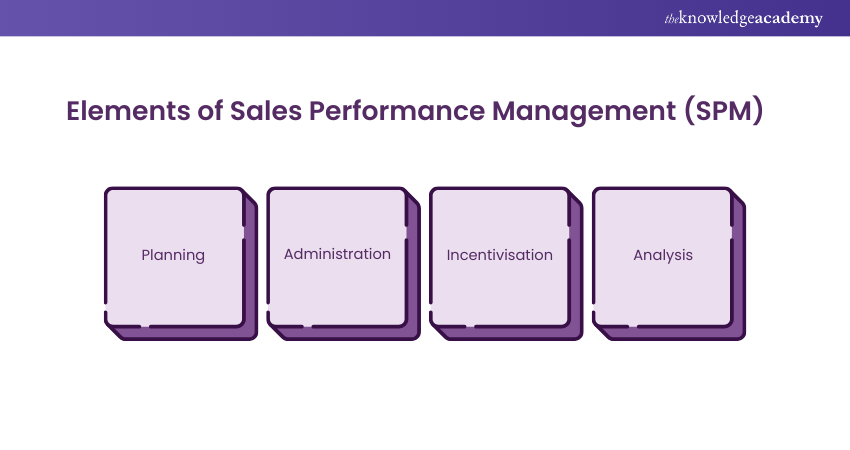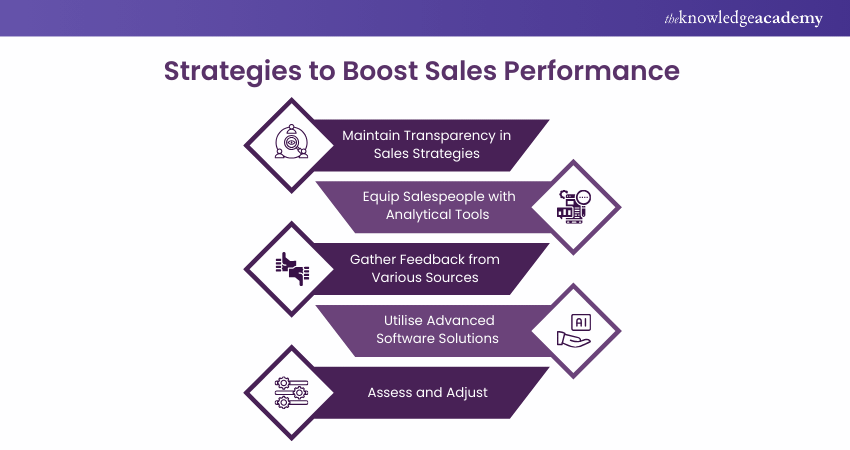We may not have the course you’re looking for. If you enquire or give us a call on + 1-866 272 8822 and speak to our training experts, we may still be able to help with your training requirements.
We ensure quality, budget-alignment, and timely delivery by our expert instructors.

Sales Performance Management (SPM) is like the coach of a sports team. Imagine a soccer team aiming to win the championship. The coach monitors how each player performs, sets training programs, and gives feedback to help everyone improve. SPM does something similar; it tracks how salespeople are doing, sets goals, and provides guidance to improve their performance. Just as a good coach can lead a team to victory, effective SPM can help a sales team hit their targets and achieve success.
It's all about ensuring everyone is playing their best game, scoring goals, and winning in the competitive market. Thus, it is crucial for Sales Managers to learn about Sales Performance Management approach and climb the ladder to success.
Table of Contents
1) What is Sales Performance Management?
2) Significance of Sales Performance Management
3) Elements of Sales Performance Management
4) Strategies to Boost Sales Performance
5) Benefits of Sales Performance Management
6) Advantages of Sales Performance Management
7) What to Look for in Sales Performance Management Software?
8) Conclusion
What is Sales Performance Management?
Sales Performance Management (SPM) refers to the process and tools used by organisations to effectively manage and enhance the performance of their sales teams. It involves the following:
a) Setting clear sales goals and targets
b) Tracking and analysing sales data
c) Providing feedback and coaching to sales representatives
d) Implementing incentive and compensation plans
Thus, SPM aims to align sales activities with organisational objectives, maximise sales productivity, and drive revenue growth.
Significance of Sales Performance Management
The importance of SPM stems from its role in propelling organisational achievement and expansion. Here are some key reasons why SPM is important:
1) Goal Alignment: SPM guarantees that the sales team's objectives are in harmony with the organisation's broader goals. Setting clear targets helps focus sales efforts on driving revenue, market share, and other strategic outcomes.
2) Performance Tracking: SPM enables organisations to track and measure sales performance effectively. It offers clarity on crucial indicators, such as sales revenue, conversion rates, and customer acquisition, allowing management to identify areas of improvement and make data-driven decisions.
3) Feedback and Coaching: It facilitates ongoing feedback and coaching for sales representatives. Regular feedback sessions help identify strengths, address weaknesses, and provide guidance for improvement. This inculcates a culture of continuous learning and development within the sales team.
4) Incentives and Motivation: SPM incorporates incentive and compensation plans to motivate sales teams. Rewarding high-performing individuals based on their achievements encourages a competitive spirit, boosts morale, and drives sales productivity.
5) Sales force Optimisation: SPM helps optimise the sales force by identifying top performers, analysing their strategies and techniques, and sharing best practices across the team. This enhances overall sales effectiveness and efficiency.
6) Data-driven Insights: SPM leverages data analytics to provide valuable insights into sales performance trends, customer behaviour, and market dynamics. These indicators enable organisations to make informed decisions, refine sales strategies, and seize new opportunities.
7) Sales Team Collaboration: This approach promotes collaboration and teamwork within the sales force. Establishing clear communication channels and fostering a supportive environment encourages knowledge sharing, cross-selling, and collaboration among sales representatives.
8) Scalability and Adaptability: SPM frameworks can be scaled and accustomed to meet the changing needs of organisations. As businesses grow and market conditions change, SPM allows for flexibility in adjusting goals, strategies, and performance metrics.
Transform your sales approach today! Join our Sales Training and boost your results like never before!
Elements of Sales Performance Management
Sales Performance Management is a holistic strategy that organisations adopt to enhance and optimise their sales processes. It involves strategically integrating various elements to ensure that sales teams operate efficiently and effectively.

1) Planning
Sales process performance management cannot succeed without any smart planning. It entails creating goals, designating sales regions, stating quotas for salesmen and women and setting objectives.
A properly designed sales plan takes into account market trends, competitor analysis, and the strategic viewpoint of the whole business. The marketing plan also takes into account ensuring that the sales team’s objectives are in cohesion with the organisational goals, which shows that everyone is moving in the same direction.
2) Administration
Administration in SPM pertains to the efficient organisation and management of sales-related activities. This includes overseeing sales processes, managing customer relationships, and ensuring adherence to relevant policies and procedures.
Effective administration involves the use of technologies like Customer Relationship Management (CRM) Systems to follow up and manage customer interactions, sales transactions, and performance metrics. Streamlining administrative tasks enables sales teams to focus more on revenue-generating activities.
3) Incentivisation
Incentivisation entails selecting and putting into practice a motivate/reward strategy to influence sales performance. These encompass working on commission scales, bonuses and acknowledgement systems that may motivate the sales representatives to achieve or even surpass the laid down goals.
An effective reward system creates competition based on the target set for each employee and team while working towards a common vision.
4) Analysis
In SPM, analysis entails evaluating sales data with a view of appreciating issues of performance, customer and the market. This involves things like evaluating the company’s conversion rates, the velocity of sales, and the cost of acquiring a customer (CAC).
Data Analytics Tools enable the organisations to see gaps and risks within the sales processes hence keep the opportunities and strengths part of it. Therefore, it fosters decision-making as well as the improvement process.
5) Prediction
The Predictive element of SFA incorporates Analytics involving Artificial Intelligence that maintains a capacity for forecasting potential future sales trends and other results. By quantifying the past performance of their sales force, organisations can better forecast future performance by considering other factors such as changes in market environments, consumers, and products.
The element of prediction cultivates intelligent strategies of decision making, making businesses predict changes in the market and develop strategies on that aspect.
Strategies to Boost Sales Performance
Here are some strategies to enhance Sales Performance:

Here are some strategies to enhance Sales Performance:
a) Maintain Transparency in Sales Strategies: Sales teams can align their efforts by clearly communicating sales strategies, goals, and expectations. Transparent communication builds trust, fosters collaboration, and ensures everyone is working towards a common objective.
b) Equip Salespeople with Analytical Tools: Providing sales personnel with analytical tools is useful to understand the customers’ behavior and the market, as well as significant indicators associated with sales results. They allow for decisions to be made based on data and provide solutions for the sales teams to identify opportunities amongst their clients and understand the ways to apply the right techniques.
c) Gather Feedback from Various Sources: It is therefore important to get feedback from customers, other workers and the Sales Managers. Especially when it is done actively, feedback enables the sales teams to learn their strong and weak points and try to adapt as the most successful selling strategies. Promotion of feedback systems helps in creating reinforcing feedback systems for constant growth.
d) Utilise Advanced Software Solutions: Using advanced software solutions like CRM Systems and sales automation tools can streamline sales processes and enhance productivity. These solutions assist in managing customer relationships, tracking leads, automating administrative tasks, and providing real-time insights.
e) Assess and Adjust: Regularly assessing sales performance metrics and adjusting strategies accordingly is crucial for ongoing improvement. Analyse sales data, identify patterns and adjust tactics to capitalise on successful approaches while addressing areas that require improvement. Flexibility and adaptability are key as sales environments evolve, ensuring sales teams stay agile and responsive.
Learn to analyse Sales Analytics and improve team performance by signing up for the Sales Analytics Training now!
Benefits of Sales Performance Management
The integration of Sales Performance Management has become imperative for companies striving to optimise their sales processes and enhance overall efficiency. This integration involves the seamless incorporation of SPM tools and practices into the organisation's existing framework. Here's how this integration works:
1) Unified Data Management
Incorporating a Unified Data Management System is a foundational step in integrating Sales Performance Management. This involves consolidating data from various sources, such as CRM Systems, marketing platforms, and sales channels, into a centralised repository.
By creating a single source of truth, our company ensures that all relevant information is easily accessible and up to date.
Unified Data Management also streamlines processes and enables a comprehensive view of sales performance metrics. This holistic perspective empowers decision-makers with accurate insights into individual and team achievements, customer interactions, and market trends.
2) Automated Analytical Processes
The integration of Sales Performance Management brings forth the implementation of Automated Analytical Processes, revolutionising the way our company interprets and utilises sales data. Automation enhances the speed and accuracy of data analysis, freeing up valuable time for sales teams to redirect their focus from routine manual tasks to more strategic initiatives, fostering a proactive approach.
It is also a way of knowing KPIs and trends, allowing the development of an accurate forecast and powerful strategies. Machine Learning algorithms and analytical methods allow you to anticipate markets shifts and a customer's behaviour in advance, therefore leading to proactive decision-making. Through taking a proactive approach, sales teams can stay ahead of competition and concentrate on new capturing trends.
Advantages of Sales Performance Management
Sales Performance Management offers several advantages that can significantly impact the success of your business. Let's dive into some key benefits of implementing SPM:

1) Clear Goals and Focus
SPM helps your sales team stay focused on clear goals and objectives. By aligning individual targets with overall business objectives, everyone knows what they need to achieve. This clarity drives motivation, productivity, and a sense of purpose among sales representatives.
2) Improved Performance
SPM provides the tools and strategies to improve sales performance. By tracking key metrics, analysing data, and offering feedback, you can pick out areas for improvement and implement targeted solutions. This leads to enhanced sales techniques, increased conversion rates, and improved overall performance.
Start closing more sales effectively by signing up for the Closing Sales Training now!
3) Enhanced Accountability
With SPM, accountability becomes a core value within your sales team. Clear performance metrics and targets hold individuals accountable for their results. It encourages a sense of ownership, responsibility, and a drive to meet and exceed expectations.
4) Motivated Sales Team
SPM incorporates incentive and reward systems to motivate your sales team. By offering attractive compensation plans and recognition for high achievers, you create a culture of healthy competition and motivation. This boosts morale, encourages teamwork, and fosters a positive work environment.
5) Data-driven Decision Making
SPM uses data and analytics to make informed decisions. By analysing sales data, customer trends, and market insights, you gain valuable information that guides strategic decision-making. This enables you to identify new opportunities, optimise sales strategies, and adapt to a changing market environment.
6) Efficient Sales Processes
Implementing SPM streamlines sales processes and improves efficiency. By utilising technology solutions, such as CRM systems and automation tools, you can automate administrative tasks, manage customer relationships more effectively, and provide sales teams with the tools required to work more efficiently.
Acquire the skills to handle sales objections and increase prospects, by signing up for the Handling Sales Objection Training now!
7) Better Customer Relationships
SPM emphasises building strong customer relationships. By focusing on customer needs, providing personalised experiences, and nurturing long-term connections, you enhance customer loyalty and increase repeat business. Satisfied customers become advocates for your brand, leading to a positive reputation and sustained growth.
What to Look for in Sales Performance Management Software?
The decision to choose the good SPM software increases the efficiency of your teams and improves sales results. Here are key features and considerations to keep in mind when evaluating options:
1) Detailed Tracking:
a) Opportunity to compare an individual and team results with the set goals.
b) It has real-time dashboards and reports that bring a level of transparency.
2) Customisable Incentive Plans:
a) Endorses differential pay systems for motivating various sales positions.
b) Speeds up the calculation of incentives for the right amounts.
3) Analytics and Forecasting:
a) Affords consultative analysis for the purposes of market forecasting.
b) Presents tools for revenue forecasting and enhancing organization’s performance.
4) Integration Capabilities:
a) This fully integrates with current CRM, ERP, as well as HRM systems.
b)It allows the data to be updated across the different platforms with about the same data.
5) Ease of Use:
a) A straightforward graphical user interface (GUI) that is easy to master without requiring extensive training sessions.
b) On the move sales team access and independence.
6) Scalability:
a) Scales as your business grows to provide for a broadening sales force headcount.
b) Permits the creation of technologies consistent with change and humans’ requirements in terms of organization plans and features.
7) Compliance and Security:
a) They help to prevent accidents that may endanger people’s lives or lead to their (People’s) death.
b) Uses effective security solutions in order to prevent leakage of confidential information.
8) Automation Features:
a) Saves time on activities that can be performed mechanically such as goal establishing, monitoring and evaluation.
b) Lightens that administrative burden left on the sales teams to do more selling.
Conclusion
We explored the significance of Sales Performance Management, its key elements, and strategies to supercharge sales. Integrating SPM into your company is like having a winning playbook for your business game. So, whether you're a sales pro or just starting, embrace this approach and thrive.
Want to learn more about how to manage people? Sign up for Management Training For New Managers!
Frequently Asked Questions
What are the Two Types of Performance Management Systems?

The two types of performance management systems are:
a) Traditional Systems: Focus on annual appraisals and evaluations based on set goals.
b) Continuous Systems: Emphasize ongoing feedback, real-time performance tracking, and regular check-ins to foster growth and adaptability.
Is Sales Performance Management Suitable for Small Businesses?

Indeed, Small Businesses can benefit from Sales Performance Management. This eliminates the confusion of goals, enhances monitoring of performance, and automate reward management; making small teams more effective, motivated and enhances growth. Efficiency is highly achievable and adaptable to the available means for a modest expense.
What are the Other Resources and Offers Provided by The Knowledge Academy?

The Knowledge Academy takes global learning to new heights, offering over 3,000 online courses across 490+ locations in 190+ countries. This expansive reach ensures accessibility and convenience for learners worldwide.
Alongside our diverse Online Course Catalogue, encompassing 19 major categories, we go the extra mile by providing a plethora of free educational Online Resources like News updates, Blogs, videos, webinars, and interview questions. Tailoring learning experiences further, professionals can maximise value with customisable Course Bundles of TKA.
What is The Knowledge Pass, and How Does it Work?

The Knowledge Academy’s Knowledge Pass, a prepaid voucher, adds another layer of flexibility, allowing course bookings over a 12-month period. Join us on a journey where education knows no bounds.
What are the Related Courses and Blogs Provided by The Knowledge Academy?

The Knowledge Academy offers various Sales Training, including the Sales Analytics Training, Outbound Sales Training and the Sales Negotiation Training. These courses cater to different skill levels, providing comprehensive insights into Outbound Sales.
Our Business Skills Blogs cover a range of topics related to Sales Performance Management, offering valuable resources, best practices, and industry insights. Whether you are a beginner or looking to advance your Sales Performance Management skills, The Knowledge Academy's diverse courses and informative blogs have got you covered.
Upcoming Business Skills Resources Batches & Dates
Date
 Sales Bootcamp
Sales Bootcamp
Fri 7th Mar 2025
Fri 23rd May 2025
Fri 18th Jul 2025
Fri 12th Sep 2025
Fri 12th Dec 2025






 Top Rated Course
Top Rated Course



 If you wish to make any changes to your course, please
If you wish to make any changes to your course, please


